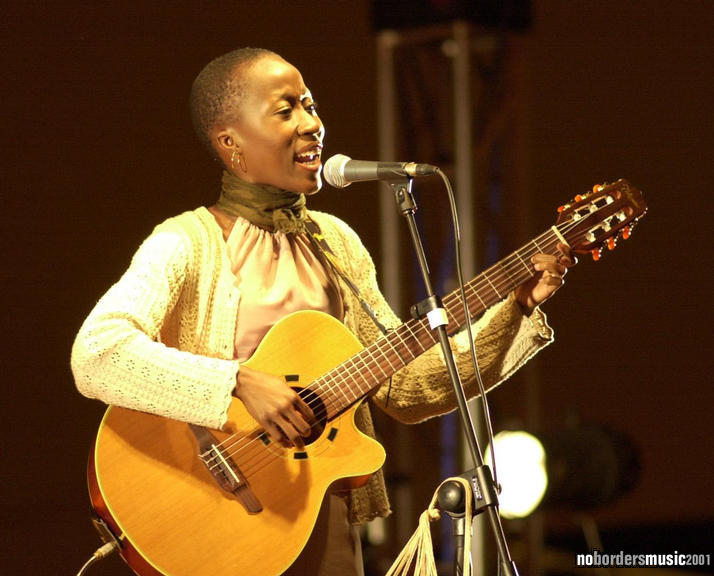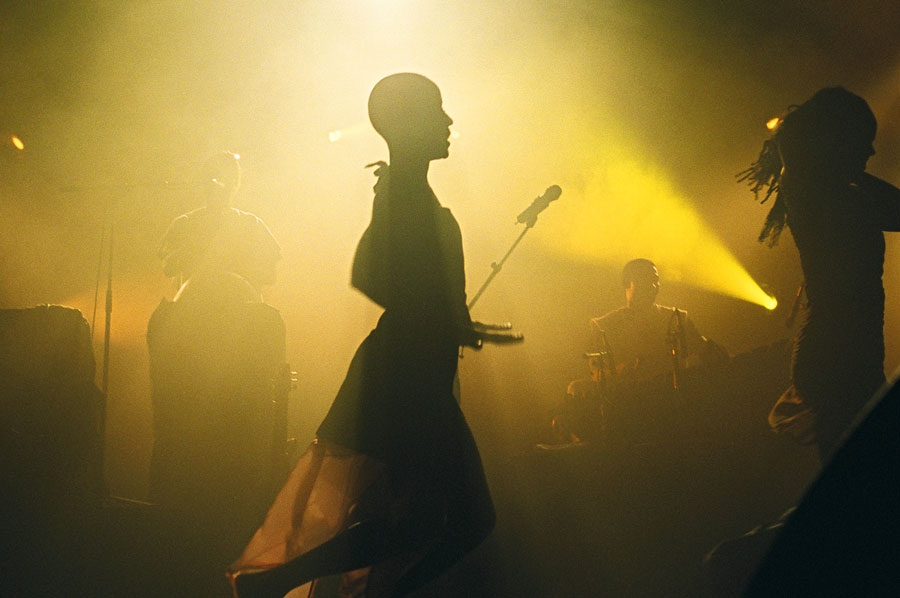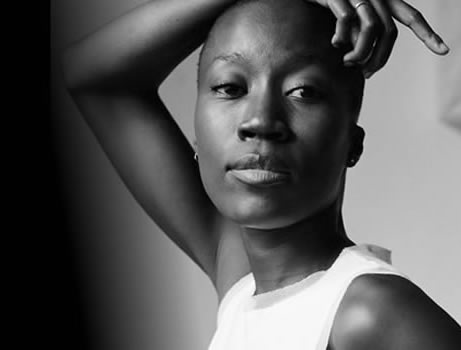ROKIA TRAORÉ / “Bowmboï”
If I'd been born 100 years ago, I wouldn’t have known American or European music, but the world we live in today means you pick up on all these other sounds and they're now part of me. I make music as someone who has listened to jazz, classical, rock and pop - everyone from Louis Armstrong to Serge Gainsbourg, as well as to the African griots.
Everywhere you look there are artists being produced and arranged by their labels to try and fit some commercial demand. I wanted to get back to the spirit I had before I was a professional musician - humility, tolerance and simplicity. Those are the underlying themes. I wanted to stay simple and stay moral and not believe my own hype.
—Rokia Traoré
I am captivated. Enchanted. Entranced. Rokia. Baldheaded in an age of weaves, extensions and perms, or at least, shoulder-length dreadlocks. She hardly looks like a superstar, slight of build, intense of gaze. Sings like a gazelle. Seldom a coy whisper or a sexy come hither; her lyrics are declarations, prayers, anthems, meditations. But no mindless club hits here.
I have been trying to decide why? Why do I like to listen so much to so much music that is foreign to me? Except, in the case of this neo-Malian music, maybe what is foreign is not so much foreign as forgotten, and, with the aural aid of Rokia's exquisite phrasing, is now retrieved from some deep place not usually visited inside me.
But it’s racist rot to assume that I dig it because I am Black. I dig it because it is beautiful. There’s stuff that is Black that I don’t dig. But then again there is something about this music coming out of Mali. Especially modern music out of Mali. Here, I am thinking about Issa Bagayogo and Baboucar Traoré, and Ali Farka Toure, and, of course, Salif Keita, and the list could be extended, but as excellent as all of them are, they are not the occasion. What is haunting me is this stunning woman whose standard is plain, unadorned, beauty.
“We have a lot of freedoms our mothers didn't have, but women have to be brave to fight for their rights. You need courage. So a lot of my songs pay tribute to strong women. I'm saying stand up and you can be free. Some people don’t like that. They want their stars to have bleached skin and wear lots of make-up and drive around in big cars. And they’re not going to get that from me.”

Plain beauty. Rokia sings with only simple accompaniment. And whether fast or slow, exuberant or plangent, she communicates with a profound intensity that is both admirable and astounding.
What Rokia does with her voice is often subtle — a graceful glissando, a slight vibrato here, a held note that grows in volume, or there she toughens the sound to express fierce determination. "I'm not based on power and volume; I'm looking in a totally different direction." Her control of her instrument. Her abandon to the spirit of the moment. Paradoxical.
“Between the second album and this record, I took singing lessons and a music theory class. I studied vocal techniques and that’s definitely given my singing more confidence, but the spirit you hear in the music is not about technique or what I do on the record. It's because of what I have lived through.”
Born in 1974, the daughter of a Malian diplomat, Rokia spent her early years on the road, and hence, was often an alien in non-African and/or non-Third World environs. So much of her formative years spent in non-Malian spaces. So she was alone. And wrote to herself. And learned languages.
"When I was a child and a teenager, I was very often sad, but at the same time, that built my personality. I liked to stay alone and just listen to music, sometimes dreaming that I am a singer and onstage and people are listening to me. When I was sad, I just had to take a pen and a piece of paper and write about why I'm sad or why I don't understand people's attitudes around me. That was a kind of curative for me, to think I am not alone."
And then, as a young adult, Rokia returned to Mali, where she studied music, initially tutored by Ali Farka Toure. (Toure is often considered the grandmaster of Malian blues; Rokia describes him as “both a moral and professional guide in my first steps”).
Rokia’s debut was auspicious. She won awards (e.g. 1997 Radio France International African Discoveries). Numerous critics selected Wanita, her sophomore album (often the most dreaded in any artist’s oeuvre), for Record Of The Year kudos. Nevertheless, it is Bowmboï, her third album, that is the Sirius of her universe. Bowmboï is the one where all who do not know her should begin. Why? Because here her splendor is fully realized. Addressing both the world and Mali, she is a rooster: wake up, home/world.

On Bowmboï she sings her insightful and poetic lyrics solely in her Mother Tongue, Bamana. Using only acoustic instruments, Rokia produces magical results.
The world hears her Malian tongue, while fellow Malians are challenged by her worldview. To everyone, she is different.
On the one hand, she is grounded in her African culture. “Musicians are proud to go abroad and record. I was happy to do the opposite. I wanted to show you can record an international album in Mali and bring some work to the people back home. We were recording with the noises of the street and kids playing all round us because the studio wasn’t finished yet. It was very atmospheric.” On the other hand, she is bringing new ideas to an old culture (while bringing ancient ideas to the new world); her contradictions are so interesting, so beautiful. "My way of thinking today is totally based on the fact that I grew up in different places and realized very early that diversity exists."
"Kôté Don" is her musical manifesto:
Young people of the city
Smart young girls
This song is for you
You who are everything that is dynamic
Let us rejoice
Let’s dance the kôté
Youth will pass
So make the most of itMy joie de vivre is taken for shamelessness
My thirst for change for pretension
Faced with my curiosity, my quest for the new
Conservative minds spread slander
And question everything that
My times are about
But don’t listen to malicious gossip
It would be a waste of time
Youth is ephemeral
Let’s celebrate and dance the kôtéEver changing I dislike what is rigid, set
What “is” without knowing why
All that is hierachial, static
I respect my ancestors
But tradition is not infallible
It is not absolute
Time passes, we all change
Nothing remains the sameThis is for you, young people
Let’s dance the kôtéLet’s make the most of our time. Let’s celebrate
From philosophy to science
Biology to history
I master the knowledge transmitted to me
Nevertheless
The elders reproach me for my curiosity
But it is true that I am the tightrope walker
Perched high on a wire
Overlooking disparity:
The encounter between the culture of my ancestors
Where knowledge is transmitted in secret
Where the unsaid is fundamental
Since the word is sacred:
And that of my modern education
Where nothing that is thought is inexpressible.
Timeless rhythms, dawn melodies. The aesthetic of a minimalist who works on a grand scale. Why else would one selection, “Kèlè Mandi,” be multi-tracked vocals with only simple guitar backing and another song, "Bowmboï," be solo voice and Kronos String Quartet — and, yet even with nary a percussion instrument (or even indigenous instrument) in sight or sound, both tracks remain instantly recognized as indubitably African? (And be sure not to miss the hidden track at the end of the album that announces itself with hyper-speed staccato stutters from a talking drum and flows into a percussive African aerobic workout, as if to say, "You want drums? We can do that, but we will do it our way.") Rokia's abracadabra is that regardless of the circumstance she adeptly infuses her spirit into whatever is the particular environment.
This adaptability is a cultural kernel of what some of us call the African Aesthetic. And defiantly, Rokia insists this is not a commercial contrivance, not some fashionable fusion, but instead a reflection of global awareness grounded in a specific ethnic context, which in this case is acoustic Malian music. "I feel more inspired by acoustic and traditional instruments. I know their colors, and I feel comfortable with them. Putting them together to create a unique orchestration serves my moods. I want to show that with traditional and acoustic instruments you could do something different."
To take what is and make what never before was, that is what a true artist can do. And to do so as a present to the world. That is what artistic truth is really about: Here, planet. Here, all humanity. I gift you this.

Reflecting on one of the songs on Bowmboï, Rokia suggests, "It's just about diversity and how tolerant we have to be to be able to live with the others around us.... There is no perfect culture. The limit of the world is not the limit of our frontiers. We have to work on ourselves to understand and accept that we are not 'the best.' We have to realize we need 'the other' [in order] to be someone ourselves. I think everybody knows that without tolerance, nothing is possible. It's easy to think and easy to speak about it, but not easy at all to be it in everyday life."
Everyday in life to give, to share; to accept different others; to do what we can to make life better and more beautiful than when we arrived on Earth. Rokia, your example shines.
I love Aster Aweke of Ethiopia, will always fawn over Miriam Makeba of South Africa, but, right now, the voice that has my ear is Rokia Traoré.
—Kalamu ya Salaam
Click here to purchase Bowmboi
LINKS
Rokia Traoré website: http://www.rokiatraore.net
Written interviews:
http://www.globalvillageidiot.net/rokia.htm
http://www.sfgate.com/cgi-bin/article.cgi?f=/gate/archive/2004/10/14/derk.DTL
A 19-minute, Rokia Traore performance video:
http://www.bbc.co.uk/radio3/world/awards2004/
Majestic music
I’m amazed by this album. When I first got it, I popped it in my CD changer for a quick listen. It ended up staying in there for a month – I listened to nothing but Rokia for about two weeks straight. I like the entire album – there isn’t a bad, or even average, song on it – but my favorite song is the title track "Bowmboï."

The only word that comes to mind to describe Rokia’s performance (especially on the title cut but also throughout the album), is ‘majestic.’ Rokia sounds much, much older (meaning, wiser, stronger, more full of experience) than her 31 years. As Kalamu mentioned, "Bowmboï" (the song) features the Kronos Quartet, but despite the classical strings, “Bowmboï” is immediately, intensely and intimately African. It isn’t just that Rokia is singing in an African language. The whole vibe, the spirit of the music, removes me from America, from 9 to 5s, from past-due bills, from fucked-up Presidential administrations and puts me some place else, some place beautiful and good. It’s a place that exists only in my mind — I know that. But despite its incorporeality, this place is real. At least as long as the music is playing.
—Mtume ya Salaam
P.S. Also not to be missed is Rokia’s 2000 album Wanita. It is every bit as enjoyable as Bowmboï although lighter in tone and not as "spiritual" (for lack of a better way to describe it).
This entry was posted on Sunday, July 17th, 2005 at 12:02 am and is filed under Contemporary. You can follow any responses to this entry through the RSS 2.0 feed. You can leave a response, or trackback from your own site.
3 Responses to “ROKIA TRAORÉ / “Bowmboï””
July 17th, 2005 at 1:46 pm
Congratulations! For the first time in the jukebox you have achieved texture, one piece weaves into the other. My other metaphor is tonal poem, that the selection itself be a performance.
Of course, you all got a lot going on here. You got good images, good layout, good commentary. You got interviews. My God who can complain. And to top it all off, its free. Nothing is required but to click.
I know critical feedback is desired. But sometimes you just want music in the background while you working at the computer.
In any event you guys are wonderful to bring music to my attention that I probably would not know otherwise.
Rudy
July 17th, 2005 at 10:59 pm
Interesting review… I too was Cooking with Rokia Traoré last year and dug where she took the music. It was very self-assured and almost virtuosic live better than when she was promoting Wanita and the new album is still getting much play.
There is a little controversy however among those who follow African music with a theory I heard expressed that the media have anointed her because she fits a certain aesthetic of what African music is and that people don’t listen to her music back home. In other words, the tale goes that Malians these days listen to Amadou and Mariam or to pop Salif Keita joints that are never released outside Mali.
For me at least, this is all water under the bridge because Rokia is for real and is going places. She is genuinely popular and her music speaks for itself. There’s a reason I compare her to Miles Davis’s First Quintet.
Mtume says:
If anyone reading this wants to learn more about Rokia’s music, particularly from the perspective of a fellow West African (Koranteng is from Ghana), CTRL-click or APPLE-click the ‘Cooking with Rokia Traoré’ link in Koranteng’s response (see above). It’ll take you to his blog "Koranteng’s Toli" and his review of a recent Rokia Traoré live performance.
July 19th, 2005 at 12:54 am
Just listening now to this track, beautiful. I bought a DVD compilation a couple of months ago which included the last track from her Rokia Traoré Live DVD (not at Amazon, don’t ask me why!) & that one blew me away, incredible performance.
Just a question regarding ‘racism’ (& pls keep in mind that I really like ‘breath of life’), but I can’t help wondering what would happen if I started my own blog & call it ‘A conversation about white music’…. Anyway, keep up the good work.
Mtume says:
Kalamu, you want to take this one, or should I?
Kalamu says: Kalamu says:
mtume, i got it, but first let me stop laughing ;->)
other than not having any contemporary music to share, what’s stopping you "dr. feelgoed" from doing a blog & calling it "a conversation about white music"? do it! you have nothing to fear from us—we have never lynched whites for whistling a tune.
what probably would happen is that you would quickly become bored with yourself and be sneaking cross the tracks at midnight to catch a breath of life. and by the way, from the way you express your admiration for rokia traore, i don’t think the gratuitous charge of racism applies to you (and i know you didn’t mean to apply it to us!)… anyway, keep up the good work. i’m waiting…
Leave a Reply
| top |